Below is Ben Franklin on the NFATC campus. Franklin was our nation’s first diplomat.
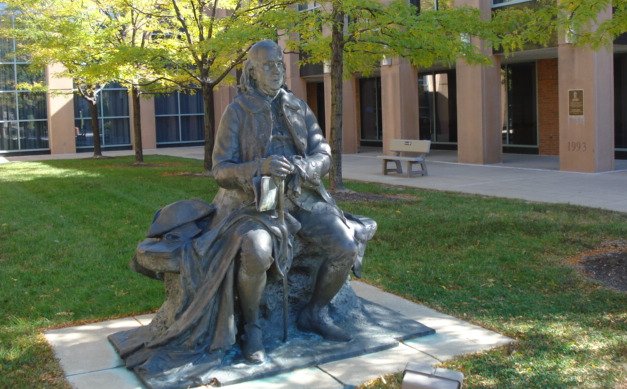
I went back to work today. Well, actually I went to the three-week training seminar. It was good to have free time, but it is good to be back at official work. Life needs a good work/leisure balance.
The training started at our Foreign Service Institute (FSI) at the National Foreign Affairs Training Center (NFATC) in Arlington, Virginia. Next week we will go to an offsite in West Virginia. They call NFATC the Schultz Center after former Secretary of State George Schultz.
Below is part of the FSI campus where I like to each lunch.

Things have improved for us. During the middle and late 1990s it wasn’t so good. Our budgets were slashed and a lot of officers were looking for jobs back then. Our diplomatic readiness was gutted, as the general consensus was that the world was a much more benign place and we were less needed. There were very few promotions and we lost about half of our public affairs officers to attrition and people being selected out. Colin Powell corrected the situation and immediately (the program started in FY 02, which was October 2001) started a diplomatic readiness initiative that brought in a lot of new officers. It takes years to “build” an FSO and we still weren’t ready when new demands were put on us after 9/11. I firmly believe that one reason why we lost ground diplomatically after 9/11 was the simple reason that we lacked the diplomatic infrastructure to properly do our jobs. During the 1990s we closed most of our libraries overseas, cut overseas staff and closed posts. We just didn’t have enough left. I hope that we don’t go back to those management conditions in the new administration. I don’t think we will. Both presidential candidate claim they want to strengthen our diplomacy and I am sure they understand that you cannot do that w/o diplomatic infrastructure.
Below – our classroom building

The leadership course was good the first day. We had sessions at NFATC/FSI (old guys like me tend to call it FSI) and at the Harry Truman Building. I cannot go into specifics about speakers etc. We have the rule that we can talk about what was said, but not who said it. It makes sense. Otherwise people would feel constrained. We talked about some interesting leadership issues, although we only began to scratch the surface. Below are a few of my take-away items, in no particular order. What you see in these notes is my take on the results of discussions among participants and are not any official points of view, BTW.
Below – we did the afternoon at Main State (Harry S. Truman Building) so I went for a walk on the Mall for lunch. This is Memorial Bridge on the Potomac.

Strategic Challenges for State Department
State, like all big-established organizations, may have trouble adapting to the new world of dispersed decision-making and diffuse power. For a couple hundred years, diplomats represented America and contacts among citizens were not very common or sustained. This began to change with faster communication, but we still had the power of official position and a control of information. Technologies such as radio or television required big investments and didn’t allow for much audience interactivity. They were ways for the leaders or elites to talk to the masses. Things are changed. Everybody has access to tools only high government officials had ten years ago. For example, I can use Google Earth to see details of almost any place on the planet. I remember how impressed I was twenty years ago to see satellite photos that the average teenager would scorn today as too grainy and primitive. Beyond that, many people now appoint themselves “represent” America. This can be good … or not. A year’s work to build America’s image and communicate with a foreign audience can be ruined when some celebrity shows up with a movie that trashes it.
Governments do well with communications where one can speak to many. It is a challenge with something like web 2.0 where many creators interact with each other. State, and the U.S. government in general can be one voice and a very important one, but no longer do we have the predominant position we had even ten years ago. We have been overtaken by technologies and we are not sure how to respond. We do not currently have the tools and will need to develop them. Success is not assured.
Below – Vietnam Memorial
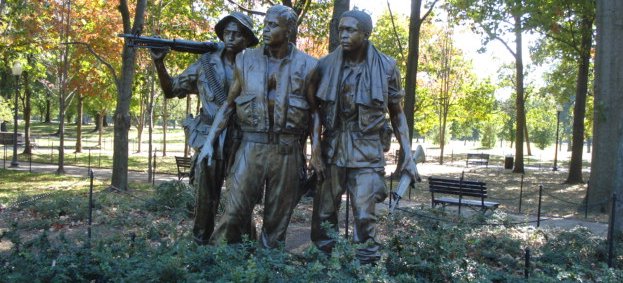
On Being Promoted
Many of us were a little diffident about our promotions. We should get over it. As leaders, it is up to us to lead. We now have the responsibility to take a stand and be proactive. We cannot blame “them” anymore because they are us.
Below – heaven & earth in the reflecting pool near the Korean Memorial
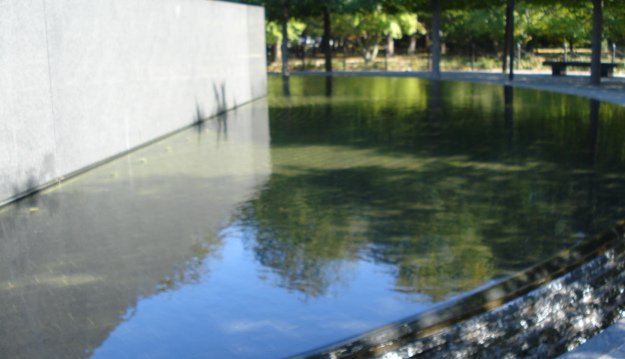
There will be some difficult transitions. Most of us made our careers by becoming masters of detail. Higher leadership requires a clear, simple vision that cuts through complexity. Some of us will suffer withdrawal and miss doing things with our own hands. In our new roles productivity comes through other people. We rarely will be able to point to something we can unambiguously take credit for doing. We all need to network more with peers, mentor those below us and know when to stand aside and let them get on with the work.
Below – Korean Memorial
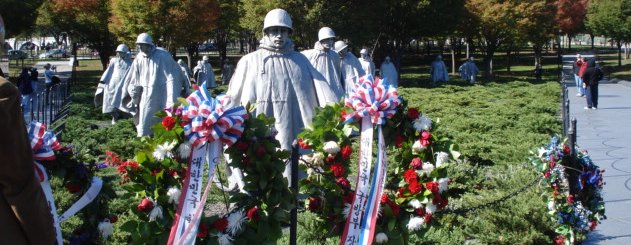
On Leadership
One of the speakers quoted Colin Powell who said the secrets of leadership success were simple. You just had to represent U.S. values, build trust and take care of your people. Simple is not always easy.
Below – Vietnam Women’s Memorial
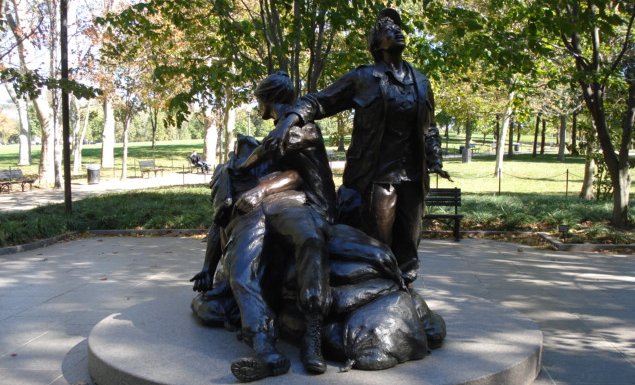
Other speakers commented that their biggest regrets came when they did not show courage and do what they thought was right at difficult times. Everybody thought trust, candor and integrity were important to leadership.
We have a lot more to do. I think we made a good start.
Homework
For homework I read an article by Peter Drucker. I read most of what Peter Drucker wrote years ago. I even had a Peter Drucker daybook with quotes, but I had forgotten a lot. This article reminded me and I was surprised at how much of his advice I had internalized.
Below – last roses of summer near Dunn Loring Metro

For example, Drucker advises people to work on their strengths instead of their weaknesses. Successful people are generally NOT well rounded. Do you know or care if Albert Einstein could fix a car or if Henry Ford knew anything about advanced physics? Of course you should get your weaknesses above the threshold point where they prevent success, but after that you are probably going to get more mileage out of building on what you are good at doing. The implication for leadership is that you should ask what a person can do well and let others compensate for the downsides. That is the strength of a team. This idea is counterintuitive. In school we are tested on the whole course and usually being really good at one chapter won’t make up for knowing nothing about the other ten. In life it does.
Anyway, Drucker has lots of good advice, but I will let you all read Drucker if you are interested. I look forward to the rest of the course.
It is a sweet deal, IMO. I enjoy this sort of thing. They pay me to do what I would pay to do.

Above is a street scene in Arlington, VA. They planted those oak trees years ago and it makes a big difference.
